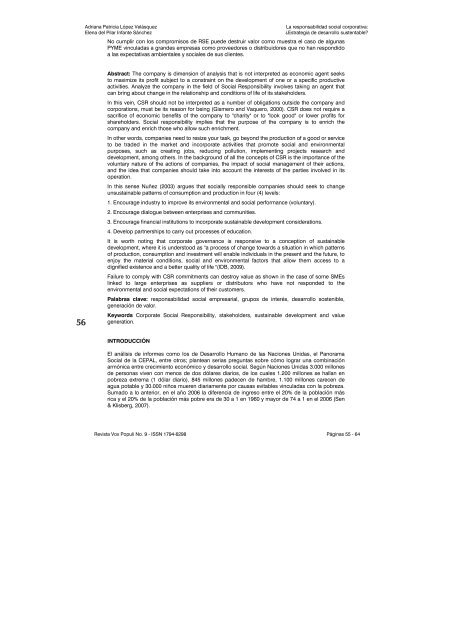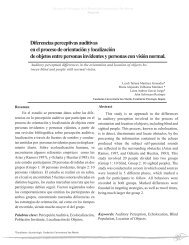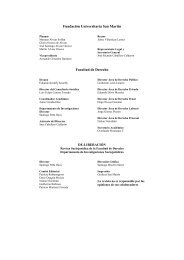Descargar Vox Populi N 9 (3MB) - Fundación Universitaria San Martín
Descargar Vox Populi N 9 (3MB) - Fundación Universitaria San Martín
Descargar Vox Populi N 9 (3MB) - Fundación Universitaria San Martín
Create successful ePaper yourself
Turn your PDF publications into a flip-book with our unique Google optimized e-Paper software.
56<br />
Adriana Patricia López Velásquez<br />
Elena del Pilar Infante Sánchez<br />
No cumplir con los compromisos de RSE puede destruir valor como muestra el caso de algunas<br />
PYME vinculadas a grandes empresas como proveedores o distribuidores que no han respondido<br />
a las expectativas ambientales y sociales de sus clientes.<br />
Abstract: The company is dimension of analysis that is not interpreted as economic agent seeks<br />
to maximize its profit subject to a constraint on the development of one or a specific productive<br />
activities. Analyze the company in the field of Social Responsibility involves taking an agent that<br />
can bring about change in the relationship and conditions of life of its stakeholders.<br />
In this vein, CSR should not be interpreted as a number of obligations outside the company and<br />
corporations, must be its reason for being (Gismero and Vaquero, 2000). CSR does not require a<br />
sacrifice of economic benefits of the company to "charity" or to "look good" or lower profits for<br />
shareholders. Social responsibility implies that the purpose of the company is to enrich the<br />
company and enrich those who allow such enrichment.<br />
In other words, companies need to resize your task, go beyond the production of a good or service<br />
to be traded in the market and incorporate activities that promote social and environmental<br />
purposes, such as creating jobs, reducing pollution, implementing projects research and<br />
development, among others. In the background of all the concepts of CSR is the importance of the<br />
voluntary nature of the actions of companies, the impact of social management of their actions,<br />
and the idea that companies should take into account the interests of the parties involved in its<br />
operation.<br />
In this sense Nuñez (2003) argues that socially responsible companies should seek to change<br />
unsustainable patterns of consumption and production in four (4) levels:<br />
1. Encourage industry to improve its environmental and social performance (voluntary).<br />
2. Encourage dialogue between enterprises and communities.<br />
3. Encourage financial institutions to incorporate sustainable development considerations.<br />
4. Develop partnerships to carry out processes of education.<br />
It is worth noting that corporate governance is responsive to a conception of sustainable<br />
development, where it is understood as "a process of change towards a situation in which patterns<br />
of production, consumption and investment will enable individuals in the present and the future, to<br />
enjoy the material conditions, social and environmental factors that allow them access to a<br />
dignified existence and a better quality of life "(IDB, 2009).<br />
Failure to comply with CSR commitments can destroy value as shown in the case of some SMEs<br />
linked to large enterprises as suppliers or distributors who have not responded to the<br />
environmental and social expectations of their customers.<br />
Palabras clave: responsabilidad social empresarial, grupos de interés, desarrollo sostenible,<br />
generación de valor.<br />
Keywords Corporate Social Responsibility, stakeholders, sustainable development and value<br />
generation.<br />
INTRODUCCIÓN<br />
La responsabilidad social corporativa:<br />
¿Estrategia de desarrollo sustentable?<br />
El análisis de informes como los de Desarrollo Humano de las Naciones Unidas, el Panorama<br />
Social de la CEPAL, entre otros; plantean serias preguntas sobre cómo lograr una combinación<br />
armónica entre crecimiento económico y desarrollo social. Según Naciones Unidas 3.000 millones<br />
de personas viven con menos de dos dólares diarios, de los cuales 1.200 millones se hallan en<br />
pobreza extrema (1 dólar diario), 845 millones padecen de hambre, 1.100 millones carecen de<br />
agua potable y 30.000 niños mueren diariamente por causas evitables vinculadas con la pobreza.<br />
Sumado a lo anterior, en el año 2006 la diferencia de ingreso entre el 20% de la población más<br />
rica y el 20% de la población más pobre era de 30 a 1 en 1960 y mayor de 74 a 1 en el 2006 (Sen<br />
& Klisberg, 2007).<br />
Revista <strong>Vox</strong> <strong>Populi</strong> No. 9 - ISSN 1794-6298<br />
Páginas 55 - 64




